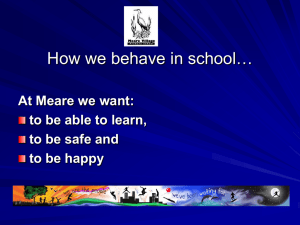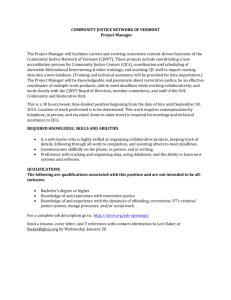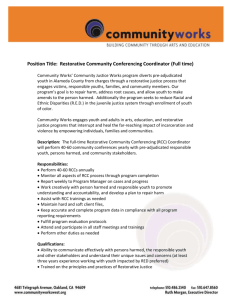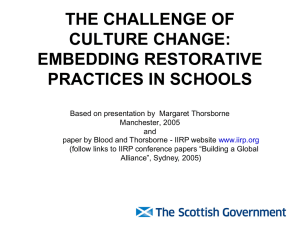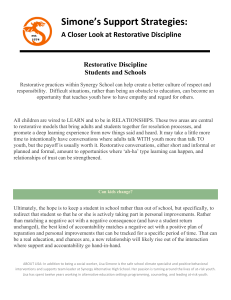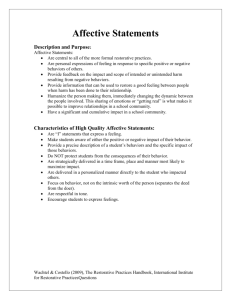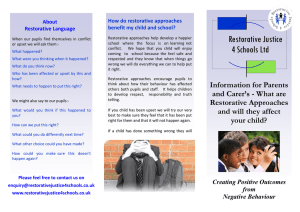RELATIONSHIPS RESPECT RESPONSIBILITIES RESTORATIVE APPROACHES IN SCOTTISH
advertisement
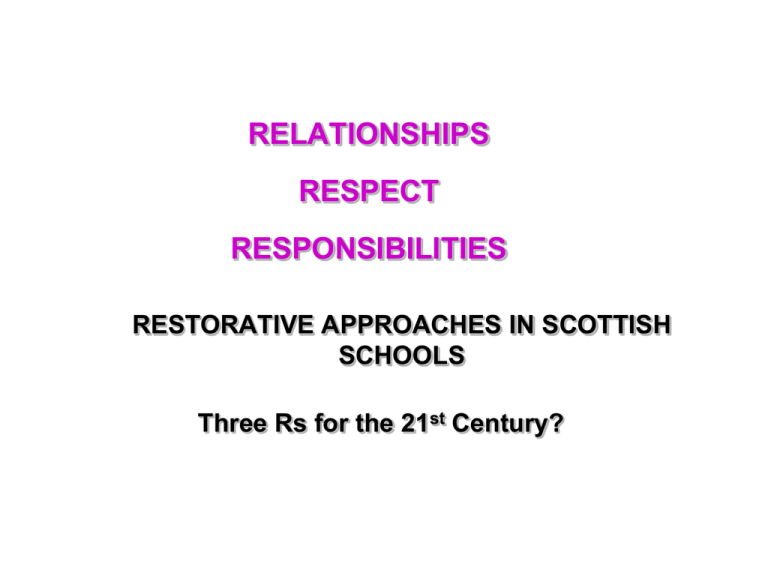
RELATIONSHIPS RESPECT RESPONSIBILITIES RESTORATIVE APPROACHES IN SCOTTISH SCHOOLS Three Rs for the 21st Century? ‘Improving Relationships and Promoting Positive Behaviour in Scotland’s Schools’ “Good relationships and positive behaviour across whole school communities are fundamental to the successful delivery of Curriculum for Excellence” “The Scottish Government is committed to building upon this work and will continue to support this through the Positive Behaviour Team” WHY RESTORATIVE APPROACHES? • They work - (dependent upon buy in!!!) • Qualitative and quantitative evidence of progress. RESTORATIVE APPROACHES THE RESEARCH • Pilot councils – Fife, Highland, North Lanarkshire • Evidence of positive impact upon relationships and behaviour • Evidence of development of essential life skills • Evidence of calmer learning environments • Young people making more good choices more often • Promotes emotional well being for all • Supportive of Children’s Services approaches SOME BACKGROUND AND TERMS • • • • • • • • • Restorative Justice Restorative Conferencing Victim/Offender Mediation Family Group Conferencing Mediation Circles vs Circle Time Real Justice IIRP - Safer Saner Schools Transforming Conflict “Restorative Practices (Approaches) are fundamentally rooted in a philosophy. They are not templates. It is this philosophy which ought to guide the way we act in our dealings with others.” (Ted Wachtel) THE UNDERPINNING MODEL PROCEDURES PRACTICES SKILLS PHILOSOPHY VALUES ETHOS PHILOSOPHY Restorative Approaches build upon the notion of positive regard which is based on the premise that we all need to be regarded for who we are. This moves our thinking away from only our actions / achievements having value. It also helps us differentiate between the person and her / his behaviour. Significantly restorative approaches are grounded in the understanding that individuals are responsible for their actions, and within our communities when an action has caused harm, those involved have a responsibility to put things right. – This moves us on from the language and culture of crime and punishment. Restorative approaches are fundamentally grounded in ‘relationships’ and in repairing, restoring and consolidating relationships when they have been harmed. TWO KINDS OF DISCIPLINE RESTORATIVE TRADITIONAL • • • • • • • • • • • • • • Harm Problem solving Dialogue + negotiation Restitution/ reparation Interpersonal Empowerment Accountability = put things right Rule breaking Blame or guilt Adversarial Punish to deter Impersonal Affected ignored Accountability = being punished THE SOCIAL DISCIPLINE WINDOW HIGH To With punitive restorative Not For Control (Limit Setting Discipline) neglectful permissive (Wachtel and McCold) LOW Support (Encouragement, Nurture) HIGH MASLOW’S HIERARCHY OF NEEDS Universal Levels of Human Need Selfactualisation Self-esteem Love,affection and belonging Safety /Security Physiological (Survival) HUMAN NEEDS • To be respected • An understanding listener • To be allowed to have emotion and to talk about them • The other person to really understand what has upset me • A genuine apology • Amends made • Support and positive reinforcement • Reassurance it won’t happen again • To draw a line underneath it WHAT IS NEEDED TO REPAIR HARM? If I have been harmed I need: • time to calm down • time to think • to be listened to • a chance to ask “Why me? What did I do to deserve that?” • the other person concerned to acknowledge the effect their behaviour has had on me and how I feel • a sincere, spontaneous apology • if possible, things put right • reassurance that it won’t happen again If I have caused harm I need: • time to think • to be listened to • a chance to explain to myself and the other person why I did it • an opportunity to apologise • a chance to make amends • reassurance that the matter is dealt with and I can move on • hope that there is no continuing resentment Restorative Approaches • Are about developing and maintaining and repairing positive relationships • Are about helping young people (and adults!) learn and develop the skills to make good choices now and throughout their lives – if we’ve learned these skills, they can be taught • Enable us to acknowledge when we have harmed someone and think about what to do to put it right • Encourage us to consider our feelings and those of others (emotional well being) • Encourages us all to consider our behaviour and the effect it has on others THE CHALLENGE OF CULTURE CHANGE: EMBEDDING RESTORATIVE APPROACHES IN SCHOOLS STAGES OF CHANGE A Trans-theoretical Model • Pre-contemplation not ready to change behaviour, and may be unaware of the need to change • Contemplation thinking about starting new behaviour in future • Preparation ready to start changing their behaviour soon • Action changed behaviour within the last 6 months, and are aware -- as are others -- of moving ahead • Maintenance ongoing support for changed behaviour 6 months + DEVELOPING A SHARED VISION Key people must be clear about the organisational goals - what the organisation will look like when they get there - and being very clear about what they want to measure and how that will happen and why it is important But more than anything, they must understand that this will mean, in all likelihood, a change in the culture - that is, “how we do things around here” or “how we do everything around here”
